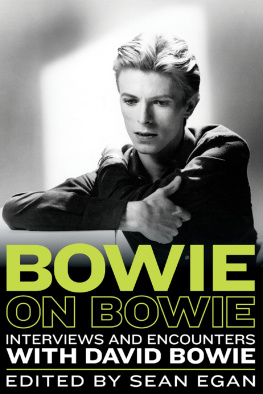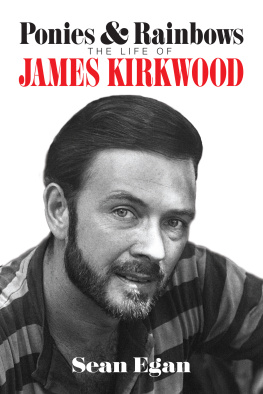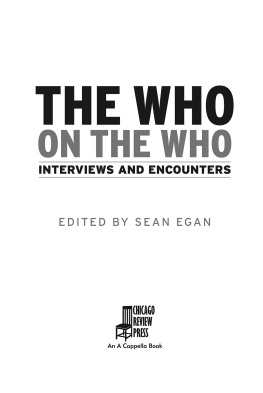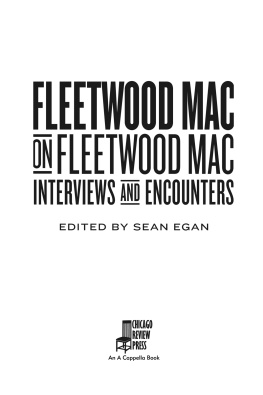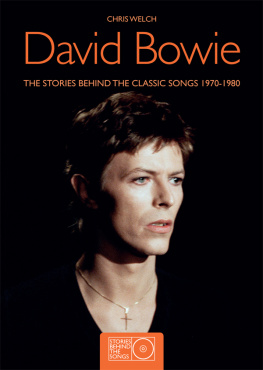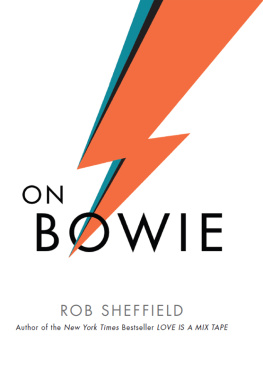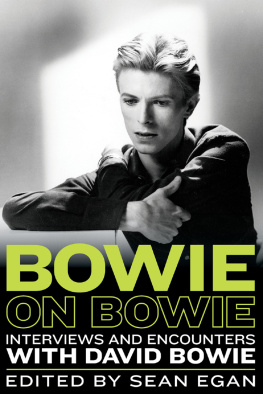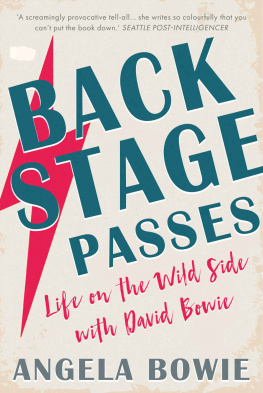Sean Egan - Bowie on Bowie
Here you can read online Sean Egan - Bowie on Bowie full text of the book (entire story) in english for free. Download pdf and epub, get meaning, cover and reviews about this ebook. year: 2015, publisher: Chicago Review Press, genre: Detective and thriller. Description of the work, (preface) as well as reviews are available. Best literature library LitArk.com created for fans of good reading and offers a wide selection of genres:
Romance novel
Science fiction
Adventure
Detective
Science
History
Home and family
Prose
Art
Politics
Computer
Non-fiction
Religion
Business
Children
Humor
Choose a favorite category and find really read worthwhile books. Enjoy immersion in the world of imagination, feel the emotions of the characters or learn something new for yourself, make an fascinating discovery.
- Book:Bowie on Bowie
- Author:
- Publisher:Chicago Review Press
- Genre:
- Year:2015
- Rating:4 / 5
- Favourites:Add to favourites
- Your mark:
- 80
- 1
- 2
- 3
- 4
- 5
Bowie on Bowie: summary, description and annotation
We offer to read an annotation, description, summary or preface (depends on what the author of the book "Bowie on Bowie" wrote himself). If you haven't found the necessary information about the book — write in the comments, we will try to find it.
Bowie on Bowie — read online for free the complete book (whole text) full work
Below is the text of the book, divided by pages. System saving the place of the last page read, allows you to conveniently read the book "Bowie on Bowie" online for free, without having to search again every time where you left off. Put a bookmark, and you can go to the page where you finished reading at any time.
Font size:
Interval:
Bookmark:
$28.95 (CAN $34.95)
D avid Bowie has been one of pop musics greatest interviewees since January 1972, when he famously risked career death by asserting to Melody Maker that he was gay. Although he wasnt yet a big star, it was a groundbreaking moment. And over the years, Bowie has failed to give an uninteresting interview. It might be said that he has habitually used the media for his own ends, but he has paradoxically also been searingly honest, declining to ever be coy about his ambitions, his private life, and even his occasional ennui.
Bowie on Bowie presents some of the best interviews Bowie has granted in his near five-decade career. Each interview traces a new step in his unique journey, successively freezing him in time as young novelty hit-maker, hairy hippie, Ziggy Stardust, Aladdin Sane, the Thin White Duke, plastic soul man, fragile Germanic exile, godfather of the New Romantics, eighties sellout, Tin Machinist, and, finally, permanently, artistically reborn beloved elder statesman of challenging popular music. In all of these iterations he is remarkably articulate. He is also preternaturally politealmost every interviewer remarks upon his charm.
The features in this book come from outlets both prestigious (Melody Maker, Mojo, New Musical Express, Q, Rolling Stone) and less well-known (The Drummer, Guitar, Ikon, Mr. Showbiz). In all cases, Bowie enables the reader to approach the nerve center of his ferociously creative and prolific output.
Copyright 2015 Sean Egan
All rights reserved
First edition
Published by Chicago Review Press, Incorporated
814 North Franklin Street
Chicago, Illinois 60610
ISBN 978-1-56976-977-5
Cover and interior design: Jonathan Hahn
Cover photograph: Photofest
Library of Congress Cataloging-in-Publication Data
Bowie on Bowie : interviews and encounters with David Bowie / edited by Sean Egan.
pages cm. (Musicians in their own words)
Summary: Bowie on Bowie presents some of the best interviews David Bowie has granted in his near five-decade career. Each featured interview traces a new step in his unique journey, successively freezing him in time in all of his various incarnations, from a young novelty hit-maker and Ziggy Stardust to plastic soul player, 1980s sell-out, and the artistically reborn and beloved elder statesman of challenging popular music. In all of these iterations he is remarkably articulate and also preternaturally polite as almost every interviewer remarks upon his charm. The features in this book come from outlets both prestigiousMelody Maker, MOJO, New Musical Express, Q, Rolling Stoneand less well-knownthe Drummer, Guitar, Ikon, Mr. Showbizbut no matter the renown of the magazine, newspaper, or website, Bowie lets us approach the nerve center of his notoriously creative outputProvided by publisher.
Includes bibliographical references and index.
ISBN 978-1-56976-977-5 (hardback)
1. Bowie, DavidInterviews. 2. Rock musiciansEnglandInterviews. I. Egan, Sean, editor. II. Bowie, David, interviewee.
ML420.B754B693 2012
782.42166092dc23
2014042080
Printed in the United States of America
5 4 3 2 1
Index
In 2013, David Bowie thrilled a world that had assumed he had long retreated into unannounced retirement by releasing The Next Day, his first album in ten years. Its refusal to pander to audience expectation in the manner of autopilot latter-day albums by peers like The Rolling Stones and The Who was a mark of the individualism for which he has always been renowned. A UK No. 1, it made a career-high US No. 2.
The only disappointment was that he decided not to speak to the press.
At the turn of the seventies, the man born David Robert Jones on January 8, 1947, was exploiting the moon landings to get into what was then called the Hit Parade with his space-dream-gone-wrong anthem Space Oddity. In 1971, he was half-heartedly promoting Hunky Dory, an album so good as to now be considered an all-time classic, but which he was barely interested in at a juncture where his creative energies were focused on The Rise and Fall of Ziggy Stardust and the Spiders from Mars. The strangeness of the mouthful of a title of that 1972 work was representative of a unique record which, though a naked tilt for stardom, played with notions of sexuality and artifice never essayed by any previous musician. With Aladdin Sane (1973), he seemed intent on proving he was too profane and knowing to be a pop star, yet too cynical and vain to be a rock star. He stepped out of that (very listenable) contradiction with the plastic soul of Young Americans (1975) and the chilly epics of Station to Station (1976). Miraculously, he sidestepped the scorn of the UKs punk rock movement of 76/77 by both being absent from the country and producing Low, Heroes, and Lodger (19771979), the Berlin trilogy whose nigh-suicidal experimentalism could in no way be bracketed with the complacency and careerism of the rock aristocracy that had so aroused New Wave fury.
Admittedly, there was a subsequent album trio informed by somewhat less integrity in the shape of 19831987 stinkers Lets Dance, Tonight, and Never Let Me Down, but Bowie ultimately took hold of himself sufficiently to ensure that that period was not what it seemed at the time: the preamble to the sort of long, slow decline seen with so many heritage acts. The Tin Machine experiment was an artistic failure, but nobody could accuse someone who was subsuming his stardom into an intellectual heavy metal band of resting on his laurels. Bowie started to haul himself back to artistic credibility with Black Tie White Noise (1993), and if the consensus that his last great album is 1980s Scary Monsters (and Super Creeps) has not subsequently been dented, his post-93 work has always been interesting and, crucially, adventurous.
Bowies career was brought to a rude halt in mid-2004 when he suffered a heart attack. It was a shocking occurrence for such a preternaturally youthful-looking man, although the fact that several of the features in this book make reference to his chain-smoking of Marlboro cigarettes diminishes that shock. It caused the cancellation of the final fourteen dates of the A Reality tour, which itself had already been marred by an audience member throwing a lollipop in his eye. The ten-year silence that followed was ominous. Pulling out of the hat The Next Day was in Bowies long tradition of surprising the world.
Bowie has been one of popular musics greatest interviewees since January 1972, when he famously told the Melody Maker he was gay. Although he wasnt yet a big star, it was a groundbreaking moment. Far from coming back to haunt him when he shortly made his stab at teen idoldom, it assisted him. Record-buying youth initially responded with the same revulsion as their parents, then performed a somersault when they gleefully realized that being a fan of Bowie was something with which they could shock their elders, ever the wont of the young.
Over the years, Bowie has pretty much failed to give an uninteresting interview. It might be said that he has habitually used the media for his own ends, whether it be the disputable gay quote, the mischievously headlines-generating call for a new dose of fascism in 1976 or the name-dropping of writers and painters in any number of interviews in an anxious attempt to prove hes not an archetypal rock thicko. Yet he has paradoxically also been honest, declining to be coy about his ambition, his private life, and even his developing ennui. (Who can forget his comment, also in 1976, I really, honestly and truly, dont know how much longer my albums will sell And I really dont give a shit?)
Next pageFont size:
Interval:
Bookmark:
Similar books «Bowie on Bowie»
Look at similar books to Bowie on Bowie. We have selected literature similar in name and meaning in the hope of providing readers with more options to find new, interesting, not yet read works.
Discussion, reviews of the book Bowie on Bowie and just readers' own opinions. Leave your comments, write what you think about the work, its meaning or the main characters. Specify what exactly you liked and what you didn't like, and why you think so.

